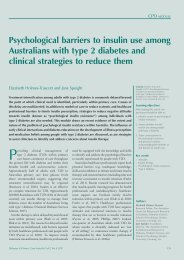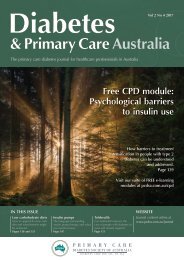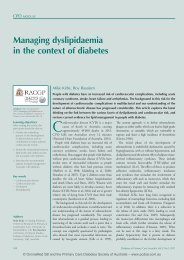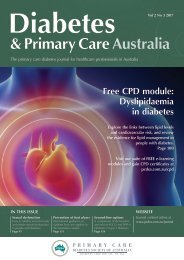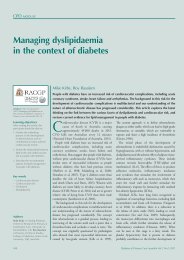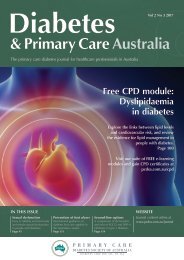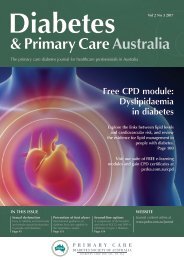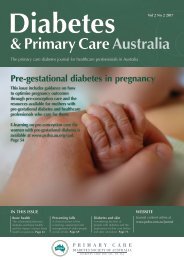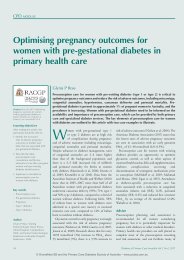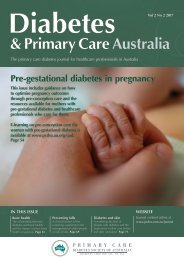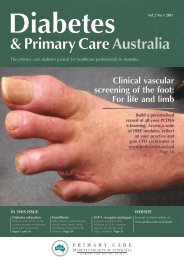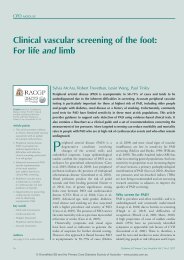DPCA2-2_issue_v2
Create successful ePaper yourself
Turn your PDF publications into a flip-book with our unique Google optimized e-Paper software.
From the other side of the desk<br />
“As a person with<br />
diabetes, my advice<br />
to the medical world<br />
would be to consider<br />
the person in front<br />
of you without their<br />
diabetes diagnosis.”<br />
champion of the tests. It was an intense time but<br />
my motivation to have healthy babies drove me<br />
to that perfection, and I went on to have three<br />
babies in 3 years. I told the medical team what they<br />
wanted to hear, but this time I wasn’t lying.<br />
It became my obsession to get the numbers<br />
right. Averaging about 12–14 blood sugars daily<br />
and the never-ending specialist appointments were<br />
vital to achieving the desired outcome. I was lucky<br />
that the care I received from my diabetes team<br />
during my pregnancies was excellent and well<br />
planned. I feel that it is vital to have a trusting<br />
relationship with an endocrinologist before, during<br />
and after pregnancies, and I was very fortunate<br />
to have that. But pregnancy with diabetes is not<br />
without its difficulties; the severe hypos during the<br />
first trimesters became frequent and increasingly<br />
exhausting, and with every pregnancy, I had<br />
another toddler to care for. My first-born was<br />
diagnosed with cerebral palsy (totally unrelated<br />
to my diabetes), and as if that was not sufficiently<br />
challenging, I became a single Mum when my<br />
youngest was 11 months old. Juggling three<br />
toddlers, a part-time job to survive financially and<br />
my diabetes became routine. The all-or-nothing<br />
personality has some advantages and in those<br />
3 years, I was switched to “all”, determined to be<br />
a good Mum.<br />
However, as the years went by, I let those<br />
numbers slip again. My three gorgeous children,<br />
my world, were growing up fast, and at aged 6, 7<br />
and 8 years, they kept me busy. I kept the medical<br />
team at length – I knew I wasn’t going to “pass the<br />
test”. My 7-year-old daughter, Presley, had spirit<br />
(sometimes too much!) and when she came down<br />
with a viral illness, as a mum with diabetes would,<br />
I checked her blood sugar. My Mum had suggested<br />
the “D” word as Presley kept sleeping through the<br />
day, which was very much unlike her. I still recall<br />
that moment, and I think I too knew something<br />
wasn’t right. Weeks later, Presley mentioned to me<br />
that she was waking through the night to go to the<br />
bathroom. I knew. I waited.<br />
My beautiful girl was dressed in her swimmers<br />
ready to go swimming. I did her blood sugar and<br />
there I was – the mother of a child with diabetes.<br />
Now it was me answering the questions not as a<br />
person with diabetes, but as a Mum. It was more<br />
than my own tests – I had to pass all of Presley’s<br />
tests as well.<br />
I felt my skills as a parent were put under the<br />
microscope. I believed it was all my fault if her<br />
numbers weren’t right. What was she eating when<br />
I wasn’t there? Was she exerting too much energy<br />
during lunchtime at school? Could she recognise<br />
a hypo? I felt like I had to live in her head, and<br />
I became the “helicopter” Mum. Presley too<br />
hated the medical world, clamming up at all the<br />
questions and hating the scales and numbers. At<br />
home, she dealt with the never-ending motherly<br />
concerns and requests to check her blood sugar,<br />
blaming every ailment or headache on diabetes,<br />
whether or not it was.<br />
Where I am now<br />
Despite some complications of my own, at 44 years<br />
of age, I now take care of myself and feel as well as<br />
I can feel, given my past “bad behaviour”. I have<br />
a good relationship with my team and appreciate<br />
the rapport I have with them, which has taken<br />
many years to establish and develop. I now take<br />
charge of my appointments and we talk about the<br />
concerns I have. The first questions asked are not<br />
“shall we look at the numbers?” or “how many<br />
highs/lows are you having?”; rather, “how are you,<br />
and what’s going on in your world?”<br />
I have had a lovely relationship with my<br />
psychologist who somehow allows me to be proud<br />
of who I am and what I have achieved. I am now<br />
free of the judgement calls that I thought were<br />
placed on me as a person with diabetes and then<br />
as the mother of a child with diabetes. Mistakes<br />
are human. Rough patches enable us all to make<br />
better choices, and experience allows us to call the<br />
shots. It’s OK not to be perfect. I truly hope that<br />
if anything, I can pass this on to my children and<br />
that they reach this point a whole lot sooner than<br />
I did.<br />
As a person with diabetes, my advice to the<br />
medical world would be to consider the person<br />
in front of you without their diabetes diagnosis.<br />
Diabetes management is far more than looking<br />
at the numbers. Consider their state of mind<br />
and the unsaid pressures they may have put on<br />
themselves. The bravest thing one can do is to ask<br />
for help and say that we’re not OK, and creating<br />
an environment where people with diabetes feel<br />
comfortable and safe to do so is vital. n<br />
48 Diabetes & Primary Care Australia Vol 2 No 2 2017



